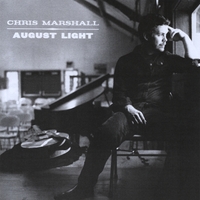Tracks
1. Every Time the Wind Blows
2. Look Out Your Window
3. For Too Long Now
4. We'll Carry On (My Love) [free MP3]
5. Killing Time
6. Thirty Pieces of Silver [free MP3]
7. All Roads Lead To Atlanta
8. Can't Wait To Take You Home
9. I Found You
10. A Hallelujah Song

|
Chris Marshall
August Light
Heartfelt alt.country/Americana with a soaring voice; delivering powerful songs about life, redemption, love, and living life to the fullest, here is an album that obviously loves life - the highs and the lows - and cherishes every moment.
 Each and every one of us has that moment: the moment where we realize our own mortality, and the mortality of those around us. For some it is the loss of innocence as they know it, while for others it is an awakening; a signal imploring one to not waste their life, to live it to the fullest, and to turn their dream's into reality.
Each and every one of us has that moment: the moment where we realize our own mortality, and the mortality of those around us. For some it is the loss of innocence as they know it, while for others it is an awakening; a signal imploring one to not waste their life, to live it to the fullest, and to turn their dream's into reality.
For Portland, Oregon-based country artist Chris Marshall, the passing of a friend awoke him, influencing him to live out his dreams and solidify the record he had spent a lifetime envisioning in his head.
Marshall lives life to the fullest on his forthcoming debut full-length, "August Light," an exploration that encompasses both the joys and the complications that making the most out of each day brings. Tackling themes as universal as love, travel, finding one's self, friendship, betrayal, heartache, and redemption, "August Light" examines these life lessons through the ultimate lens of faith: Whether it is faith in a higher power, faith in the partner sharing your bed, or faith in something as simple as a flower growing out of nothing.
"If there's any gift the winter brings, it's the deathless scent that seeds the spring," Marshall sings in "Every Time the Wind Blows," summarizing the album (and thus Marshall's) outlook on life and life's tests.
"Every season lends itself to the next, both literally and metaphorically in terms of the seasons we experience in our own lives," Marshall examines, discussing the line. "The most desperately seeming situations often produce the most profound growth, just as the winter makes way for the spring."
Not that making "August Light" was a desperate situation, but after pushing through several obstacles that saw him limping into adulthood in his later teens, one of Marshall's long held yet privately expressed goals was to make a record he could be proud of by the time he turned thirty. At the age of 29 (as of August 2010), he has accomplished that goal, feeling and living the profound growth that resulted in "August Light."
Assembling a cast of Portland's top musicians, Marshall had a notable team in place to make the album. Bassist Allen Hunter (who has spent time touring in The Eels), former Decemberists' drummer Ezra Holbrook, and pedal steel player Paul Brainard (Richmond Fontaine) flesh out and lend quantitative weight to "August Light." Under the direction of producer Jeremy Wilson (a landmark Portland artist himself, who once was and has now returned to his post as lead singer of seminal college rock outfit the Dharma Bums), it was precisely this team of PDX all-star veterans that allowed a young and developing artist to actualize his vision and make an album with a markedly prescient life of its own.
Yet even with an expert level of musicality in place, the record took on its ultimate depth of meaning through the experiential reality of life and death. While in the studio tracking what would become the album's closer, "A Hallelujah Song," Marshall received a call from one of his best friends, informing him that one of their mutual close friends was in a coma.
Floored and numb, this incident spawned a conversation with the musicians in his band, which made the songs Marshall was singing even more profound, and brought on a whole new layer of meaning to the album.
A few days later, Marshall's friend passed away. Marshall forged ahead, using the passing of his friend to give birth to something that was already becoming more than he originally envisioned.
"Throughout the remaining days of tracking and especially when doing vocals, whenever I would feel a sense of weariness, I would think of Daniel and be instantly connected to a depth of emotion and sincerity that I've never quite felt before," he comments, discussing the effect his friend had on the album. "The entire album is dedicated to his life and memory."
Discussing interpersonal/relational betrayal ("Thirty Pieces of Silver"), love ("Can't Wait to Take You Home"), isolation and loneliness ("For Too Long Now"), and life having ultimate dominion over death ("Every Time the Wind Blows"), the album carries heavy subject matter while adhering to the universality of human experience. But, it isn't without its good-times and uplifting moments.
"Killing Time," for example, is a playful honky-tonk romp, which gives the album an upbeat, cheerful dance number to kick back and enjoy.
"I wrote the entire song in the car without a guitar and performed it that night," recalls Marshall, admitting that more than a few times he's written a complete song in his head before ever picking up the guitar. "In this case, I set out to write a song that embodied that classic country cleverness."
By the same token, Marshall doesn't shy away from writing thoughtful pop or love songs, which is evident on stand-out track "We'll Carry On (My Love)," a song that employs a measure of lyrical interplay between scenes of disparity and moments of ascendance: night and day, peaks and valleys.
"When I sing it I'm drawing upon the experience of making it work with my wife, family, community and even my country as a whole in the difficult economic times we've faced the last couple years."
"I Found You" is another love song on the album, winding through the process of finding contentedness in love, beauty, and joy. "It ultimately stands as an ode to the simplicity of love," Marshall explains. "I want the record as a whole to communicate a connectedness that defies generational, cultural, spiritual, and even political boundaries. Love is really the vehicle, in that sense."
The result is a country record that pays homage and tribute to the forefathers, such as Kristofferson, Nelson, Presley and Cash, but also gets Marshall's voice across, figuratively and metaphorically speaking.
"From a selfish standpoint, my favorite part of the album is the work I was able to do vocally. I've always felt like it was my strongest asset as a performer, and now I feel like I've finally been able to demonstrate that on a recording."
Marshall pauses, then he continues, discussing the record like a proud papa.
"Just the fact that I took the step of making an entire full-length record and having it possess a completeness unlike anything I've done to this point," explains Marshall. "I'm really proud of the work that has gone into it, and have faith that the finished product will reflect that.
"I found an analogy or parallel in the wine world that really works for me in this sense. I was talking to a winemaker who explained to me how pinot noir grapes take 4 to 5 years to produce their first quality vintage. Before that, the grapes have to develop character, take root in the soil, and really fight for their lives. If the process is done right, the grapes will respond and allow the winemaker to carry out their expression as an artisan. This record is ultimately the result of a similar process, and really my first vintage as an artist. Everything I've done until now has been in preparation for being able to create and put forward the most honest and authentic artistic expression that I can; something I can proudly put in front of anyone and believe in."
Now, the only thing left for him to accomplish with "August Light" is to get as many people as he can to hear it.
Chris Marshall's Official Site
TO ORDER:
"August Light": http://www.cdbaby.com/chrismarshall12
Or you can call 1-800-BUY-MY-CD with any major credit or debit card.
You can also order "August Light" direct by sending $14ppd check or money order to:
In Music We Trust, Inc.
15213 SE Bevington Avenue
Portland, Oregon 97267-3355
If you have any further questions, etc. please e-mail the In Music We Trust President
Alex Steininger at: [email protected].

